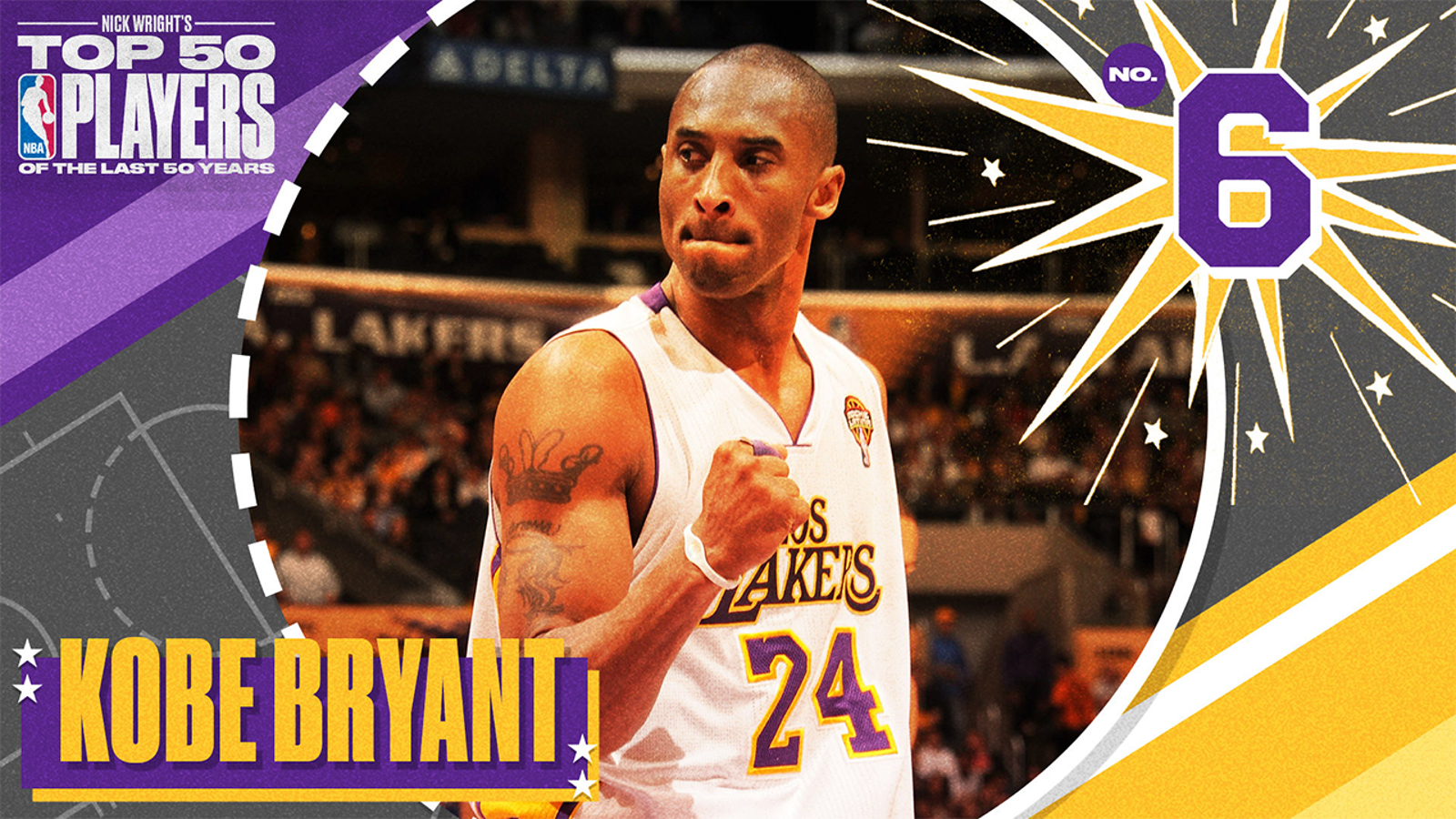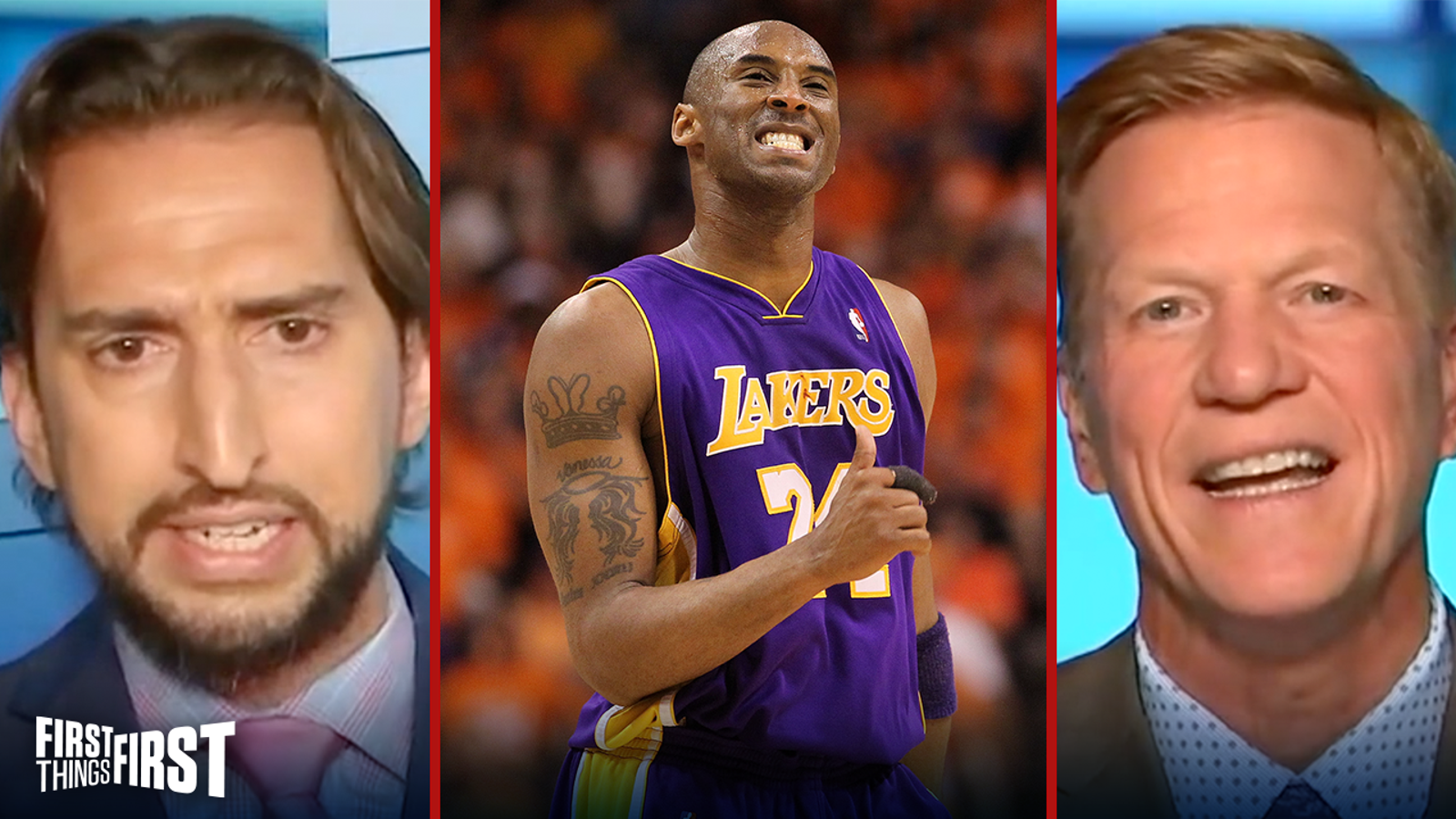
Top 50 NBA players from last 50 years: Kobe Bryant ranks No. 6
Editor's Note: As part of a new series for his podcast "What’s Wright with Nick Wright," FOX Sports commentator Nick Wright is ranking the 50 best NBA players of the last 50 years. The countdown continues today with player No. 6, Kobe Bryant.
Kobe Bryant’s career highlights:
- Two-time Finals MVP
- 2008 league MVP
- 18-time All-Star
- 11-time first-team All-NBA, two-time second team, two-time third team
- Nine-time All-Defensive first team, three-time second team
- Two-time scoring champion
- 1997 All-Rookie team
- Fourth on all-time scoring list
Kobe Bryant is your current favorite player’s favorite player.
He might not have succeeded in his career-long quest to surpass Michael Jordan. But Kobe's combination of skill, tenacity and idiosyncrasies ultimately endeared him to his peers more so than with His Airness.
"A guy who everyone has an opinion of," Wright said. "A handful of guys who played against him say, ‘No, I actually think he’s one of the two greatest players ever.’"
Kobe Bryant is No. 6 on Nick Wright's Top 50 NBA Players of the Last 50 Years
While no ranking of the late Lakers legend will satisfy everyone, his journey proved to be far more fascinating than his eventual destination.
In 1996, he became the first guard to turn pro out of high school. That’s since become a footnote, but it explains how the 17-year-old fell to No. 13 in the draft and was made available for veteran center Vlade Divac in one of the most lopsided trades in sports history.
The deal was bad from the beginning, as the 6-foot-6 shooting guard flashed more than just upside as a rookie. Bryant routinely produced when appearing in more than garbage time and scored 22 points in his first playoff game with extended action.
Many might recall his four airballs in an elimination game versus the Jazz that year. What’s often forgotten is that Shaquille O’Neal had already fouled out, Robert Horry had been ejected, and Byron Scott was sidelined with an injury. The teenage Bryant was equal parts fearless and flawed.
He’d develop so quickly that he was voted an All-Star starter, still the youngest ever at 19, before cracking the Lakers’ starting five. His rapid emergence prompted L.A. to trade fellow All-Stars Eddie Jones and Nick Van Exel to feature Bryant more alongside Shaq.
After the duo was swept for the second time in as many postseasons, they immediately flourished in the triangle offense under Phil Jackson and longtime assistant Tex Winter. Shaq, to be specific, emerged into the best player in the league. Bryant, still only 21, was much more than a sidekick for the 67-win Lakers. He was already the NBA’s top two-way guard.
In the 2000 postseason, he exploded for 30-plus points three times in a tight first-round series versus the Kings. Two rounds later against the Trail Blazers, Bryant dropped 25-11-7 and orchestrated an alley-oop for the ages to Shaq in Game 7 to punctuate a 16-point comeback. It was a historic highlight, but Kobe’s legend grew even greater in the Finals upon returning from a severe ankle sprain that sidelined him for nearly two games. With Shaq having fouled out, Bryant scored six points in the last two minutes of overtime to give L.A. an insurmountable 3-1 lead over the Pacers.
"He was the unquestioned second-best player on a dominant champion," Wright said. "In 2001 is when he fully arrived as a top-five player, that playoff run in 2001. He was dominant. Utterly dominant."
Bryant posted 29-7-6 in the Lakers’ second title run, including 48 points and 16 rebounds and 45 and 10 in consecutive games. The Lakers were cruising to a three-peat until they met Sacramento in the conference finals. Kobe struggled through five games but topped 30 and 10 in Games 6 and 7, playing nearly every minute to help L.A. escape. He then went for 36 in the closest game amid a Finals sweep of the Nets.
"The Shaq numbers are cartoonish during these three years, but that shouldn’t overshadow what Kobe did," Wright said.
Kobe Bryant ranked too low?
By this point, Bryant was arguably the third-best player in the league, behind Shaq and Tim Duncan. Yet as Bryant entered his apex, friction surfaced between the Lakers’ superstars. Kobe (30-7-6) had a magnificent 2002-03 season but was inconsistent in a second-round loss to the Spurs, which saw him dramatically outshoot Shaq despite being significantly less efficient. That trend only worsened in the 2004 Finals, with Bryant shooting 38% from the field and 17% from 3 in a five-game loss to the Pistons.
Moreover, his relationship with O’Neal and Jackson had cratered in the aftermath of his sexual assault case. Bryant was also an impending free agent, leaving Lakers management at a crossroads in the summer of 2004. Though a breakup could have been avoided, and likely cost the pair more titles, L.A. sided with the better player moving forward by re-signing Bryant and trading O’Neal.
"And now it’s a bit of a wasteland for a little bit," Wright said.
No longer saddled with another All-Star, much less the NBA’s top center, Bryant and the Lakers missed the playoffs entirely in 2005. Kobe, dubbing himself the "Black Mamba," returned with a vengeance the following year and averaged a career-high 35.4 points per game. It was the second-highest total in 40 years, and he punctuated it with 62 points in three quarters versus the Mavericks (who scored 61) and 81 against the Raptors four weeks later. That’s the second-highest single-game output ever.
Though Bryant was never better, his supporting cast was never worse, their 45 wins probably costing Kobe an MVP. In the first round, his OT buzzer-beater put the seventh-seeded Lakers up 3-1 over the Suns. But his 50 points in Game 6 weren’t enough and, after posting 23 in the first half of the deciding game, he attempted three shots and scored one point amid a blowout.
"Game 7 is the rough moment," Wright said. "Something happened at halftime in the locker room about Kobe needing to pass more. So in the second half of that game, he refuses to shoot. Then there’s the career crossroads."
Kobe, in fact, demanded a trade after another magnificent season ended in a first-round loss to the Suns. Only, L.A. didn’t budge, and its fortunes soon turned upon Andrew Bynum’s emergence and a trade for Pau Gasol. With the latter proving to be even more complementary to Bryant than Shaq, Kobe finally won league MVP and guided the Lakers back to the Finals. They’d lose to the Celtics in six but make it back — and win — each of the next two years.
"Kobe finally has a legitimate team around him, and what do they do? They make three straight Finals," Wright said. "It proved he could win it without Shaq. But did Kobe Bryant rest? Oh, no. Of course not. Kobe Bryant wasn’t the type to rest."
No, Kobe kept doing work. He averaged 30-6-6 over the back-to-back title runs, while notably overcoming a 6-for-24 shooting performance in Game 7 of the 2010 Finals by grabbing 15 rebounds and making eight of nine free throws in the fourth quarter.
"The idea that someone else should have been Finals MVP that year is nuts," Wright said.
It was impossible to know then, but the Lakers wouldn’t contend for another title with Bryant. They were shockingly swept by the eventual champion Mavericks the next year and run off the court by the ascending Thunder in 2012. The addition of Dwight Howard and an aging Steve Nash didn’t materialize into the superteam everyone imagined, prompting a 34-year-old Bryant to push himself as much as ever. His heroics ensured the Lakers made the playoffs, but he tore his Achilles in the process.
Bryant would play three more seasons but was far from the All-NBA performer he’d been the previous 15. In 2016, he closed out a 20-year career filled with indelible moments the only way he knew how: shooting and scoring. Bryant poured in 60 points (on 50 shots) in his last game.
It marked his sixth 60-point outing, which trails only Wilt Chamberlain. Kobe’s 25 50-point games and 122 40-point games are both third-most, behind Chamberlain and Jordan. Bryant is also third in 30-point playoff games (88). His stat lines of 25-5-5 in the regular season and 26-5-5 in the postseason are reserved for a select few, as is his massive contribution to five championships.
He tied the record with nine All-Defensive first-team honors, and no guard tops his 12 overall selections. His lone MVP stands out, much like Shaq's, though Kobe finished top five in the race on 10 other occasions. He’s the only player in league history to win multiple Finals MVPs without a teammate included on the NBA’s 75th Anniversary Team.
"Even though we all watched his entire career," Wright said, "because it overlapped with LeBron [James], who is going to end with all the totals records, the overall longevity and raw numbers of [Bryant] are almost forgotten by some."
Not so, however, for his basketball brilliance and tragically abbreviated life.







